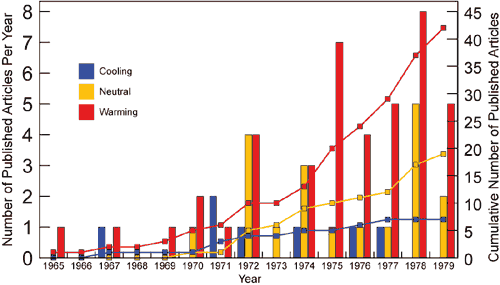
Figure 1: Number of papers classified as predicting future global cooling (blue) or warming (red). In no year were there more global cooling papers than global warming papers.
A persistent argument designed to discredit the field of climate science is that scientists predicted an ice age in the 1970s. So popular in fact that it ranks an impressive #7 in the most cited skeptic arguments. The logic goes that climate scientists got it completely wrong predicting global cooling in the 1970s (it started warming instead). Hence climate science can't be trusted about current global warming predictions. Setting aside the logical flaws of such an ad hominem argument, was there any consensus among 70s climate scientists predicting global cooling?
Most cited is a 1975 Newsweek article The Cooling World that suggested cooling "may portend a drastic decline for food production":
"Meteorologists disagree about the cause and extent of the cooling trend… But they are almost unanimous in the view that the trend will reduce agricultural productivity for the rest of the century."
A 1974 Times Magazine article Another Ice Age? painted a similarly bleak picture:
"When meteorologists take an average of temperatures around the globe, they find that the atmosphere has been growing gradually cooler for the past three decades. The trend shows no indication of reversing. Climatological Cassandras are becoming increasingly apprehensive, for the weather aberrations they are studying may be the harbinger of another ice age."
However, these are media articles, not peer reviewed scientific papers. Does a consensus on global cooling emerge from the scientific literature?
Most mentioned is Rasool 1971 which projected that if aerosol levels increased 6 to 8 fold, it may trigger an ice age. While Rasool underestimated climate sensitivity to CO2, its basic assertion that the climate would cool with a dramatic increase of aerosols was correct. However, aerosol levels dropped rather than increased. More on Rasool...
A 2003 Washington Post op-ed by James Schlesinger, Climate Change: The Science Isn't Settled, quoted a 1972 National Science Board report as follows:
"Judging from the record of the past interglacial ages, the present time of high temperatures should be drawing to an end . . . leading into the next glacial age."
The full quote from the report is as follows:
"Judging from the record of the past interglacial ages, the present time of high temperatures should be drawing to an end, to be followed by a long period of considerably colder temperatures leading to the next glacial age some 20,000 years from now. However, it is possible, or even likely, that human interference has already altered the environment so much that the climatic pattern of the near future will follow a different path.
For instance, widespread deforestation in recent centuries, especially in Europe and North America, together with increased atmospheric opacity due to man-made dust storms and industrial wastes, should have increased the Earth’s reflectivity. At the same time increasing concentration of industrial carbon dioxide in the atmosphere should lead to a temperature increase by absorption of infrared radiation from the Earth’s surface.
When these human factors are added to such other natural factors as volcanic eruptions, changes in solar activity, and resonances within the hydro-atmosphere, their effect can only be estimated in terms of direction, not of amount"
Schlesinger's op-ed has been quoted widely including James Inhofe's Senate testimony. Skeptic citing of the scientific literature have taken conclusions out of context, overlooking qualifications and stated uncertainties. What does a broader look at the scientific literature reveal?
Over time, William Connelly has been steadily documenting 70s research predicting global cooling. It's a rich resource but as he admits, could be more accessible. Now he has collaborated with Thomas Peterson and John Fleck to publish The Myth of the 1970's Global Cooling Scientific Consensus, due to be published in the Bulletin of the American Meteorological Society.
The paper surveys climate studies from 1965 to 1979 (and in a refreshing change to other similar surveys, lists all the papers). They find very few papers (7 in total) predict global cooling. This isn't surprising. What surprises is that even in the 1970s, on the back of 3 decades of cooling, more papers (42 in total) predict global warming due to CO2 than cooling.

Figure 1: Number of papers classified as predicting future global cooling (blue) or warming (red). In no year were there more global cooling papers than global warming papers.
So in fact, the large majority of climate research in the 1970s predicted the Earth would warm as a consequence of CO2. Rather than climate science predicting cooling, the opposite is the case. Most interesting about Peterson's paper is not the debunking of an already well debunked skeptic argument but a succinct history of climate science over the 20th century, describing how scientists from different fields gradually pieced together their diverse findings into a more unified picture of how climate operates. A must read paper.
Posted by John Cook on Tuesday, 26 February, 2008
 |
The Skeptical Science website by Skeptical Science is licensed under a Creative Commons Attribution 3.0 Unported License. |